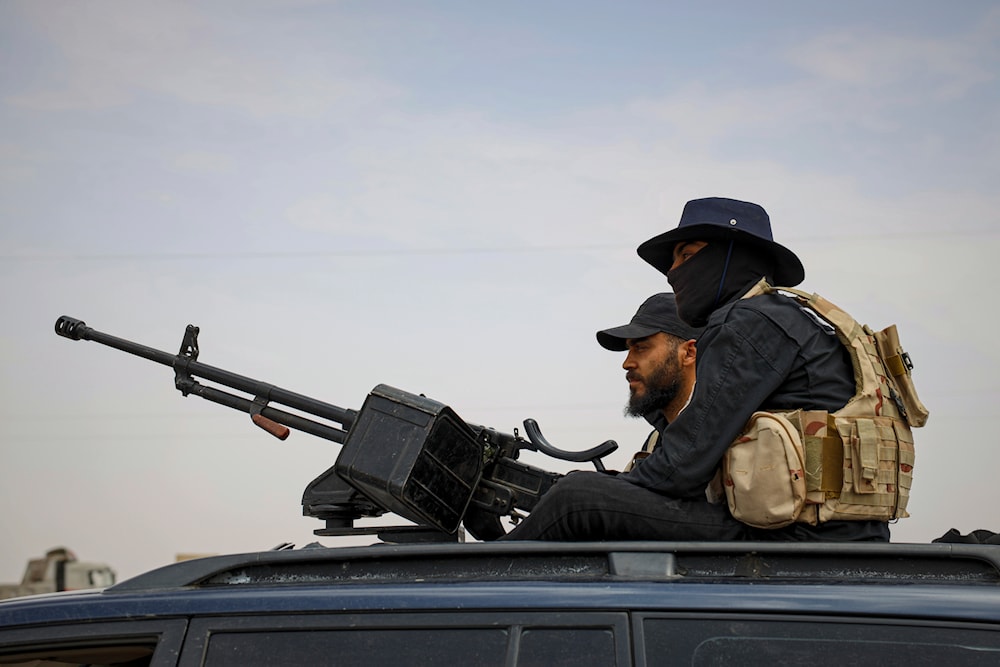Foreign fighters test Syria’s new government amid US pressure: WSJ
A recent Wall Street Journal report looked into Syria’s new government's struggles to manage foreign fighters amid US pressure and rising sectarian violence.
-

Syria's security forces are deployed at a highway where they found bodies of Syrian Druze fighters who were in a convoy heading from the southern Sweida province, Syria, on May 1, 2025 (AP)
Foreign fighters once played a key role in helping Syrian militants topple al-Assad's government and rule in his stead, but they have now become a significant challenge for the country’s emerging leadership, The Wall Street Journal reported.
As the United States and Syrians call to expel the extremist members, Syria’s new government remains deeply divided over how to handle thousands of foreign militants. The Wall Street Journal highlighted on Friday that internal disagreements are mounting as concerns grow over ethnically driven violence linked to some of these groups.
Foreign fighter dilemma in post-Assad Syria
Up to 10,000 fighters from the Middle East, Europe, and Central Asia supported the overthrow of the al-Assad regime and continue to back the new authorities, but they are increasingly regarded as a liability by Syrian leaders aiming to distance themselves from their past and establish a more inclusive government.
20-year-old Uzbek fighter Muhammad Zafar told WSJ how he crossed into Syria from Turkey last October and joined the Battalion of Strangers, a Central Asian-led Islamist group, before being quickly deployed to the frontlines of an offensive coordinated by Hay'at Tahrir al-Sham, the group that spearheaded the regime change in Syria.
Zafar recounted how Uzbek commanders fluent in Arabic passed orders from Syrian leaders during the operation.
How feasible is it for foreign fighters to join army?
Now, with their service no longer seen as necessary and increasingly being regarded as a liability, he hopes to join Syria’s national army and help build a state governed by Islamic principles, describing his role as part of a “holy war”, a vision many in Syria’s diverse population of 24 million reject.
On the other hand, the United States has demanded that Syria’s interim government exclude foreign extremists from future state institutions.
On April 24, Tim Lenderking, the US State Department’s senior official for Middle East affairs, stated, “The interim authorities must ensure that foreign terrorist fighters have no role in the Syrian government or military.”
Syrian interim officials declined to comment on the United States' stance when contacted by The Wall Street Journal.
From brothers in arms to political liabilities
Following their seizure of Damascus in December, Syria’s new rulers began appointing foreign militants to senior military positions, including individuals from Jordan, Egypt, and Turkey. Ahmad al-Sharaa, Syria’s newly installed president and leader of Hay'at Tahrir al-Sham, declared that foreign combatants who supported the overthrow would be rewarded and potentially granted citizenship.
However, the presence of these militants has proven politically sensitive, with Broderick McDonald, a fellow at the International Centre for the Study of Radicalisation at King’s College London, telling The Wall Street Journal that foreign fighters possess valuable operational expertise, including battlefield tactics, propaganda production, and global fundraising networks.
McDonald claimed that many Syrians think that losing these valuable fighters would be too high a price.
Amid fears of escalating ethnic tensions, the government established an investigative committee to probe the massacres that targeted the Alawite minority in the coastal regions.
In April, officials announced that dozens had been questioned, with over 50 separate incidents under investigation, while lawmakers approved a three-month extension for the committee to complete its work and gather testimonies.
Too high a price?
Despite President al-Sharaa’s public distancing from extremist elements, many Syrians remain skeptical. As he insists that the new government will represent all ethnic and religious communities, even those critical of foreign fighters acknowledge the difficulty of expelling them.
While some foreign militants may now redirect their focus to conflicts in Africa or elsewhere, WSJ highlighted growing fears that others could turn against Syria’s new leadership if forced to abandon Islamist ideals or return to their home countries, where they risk prosecution or persecution.

 4 Min Read
4 Min Read










